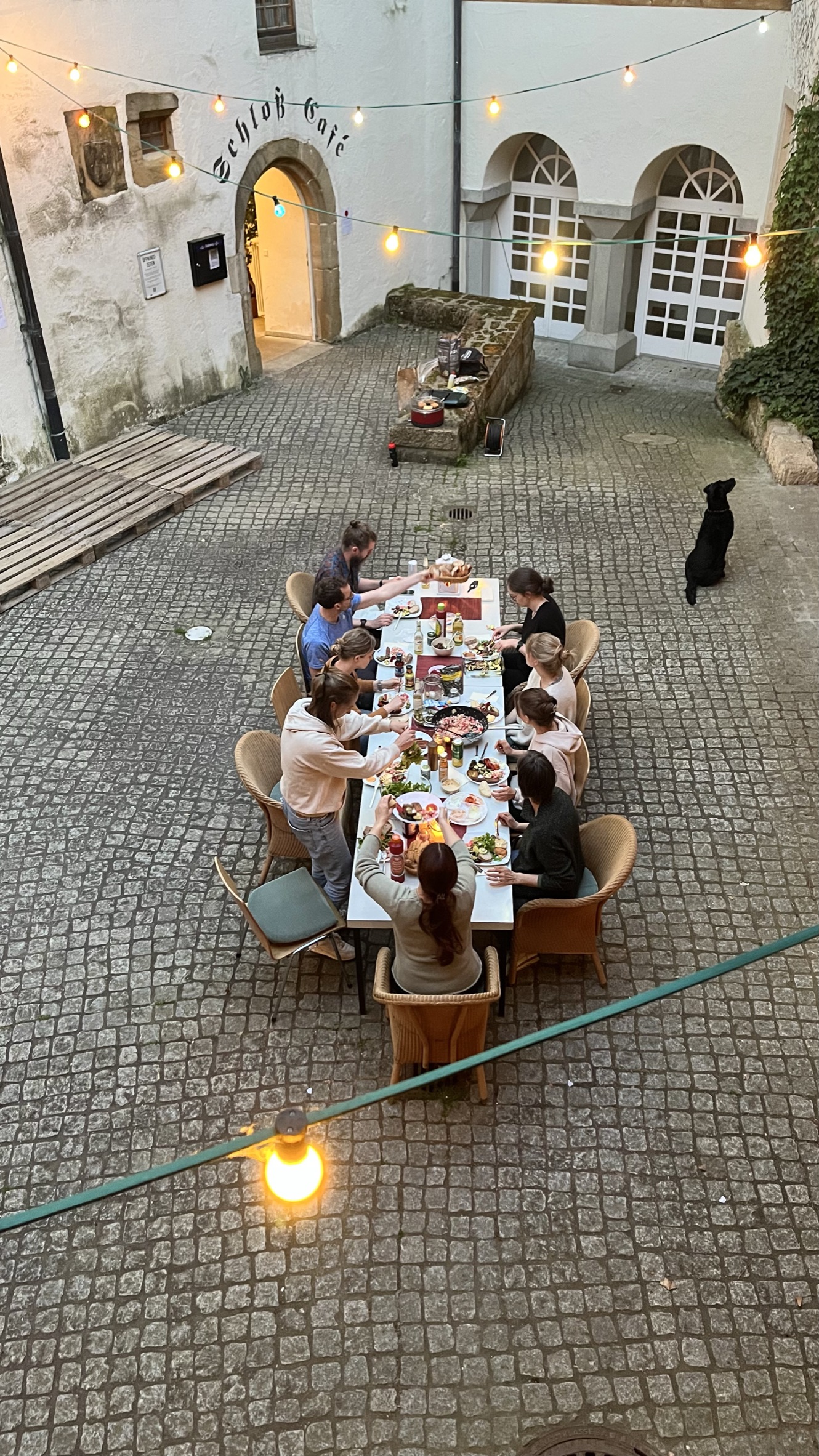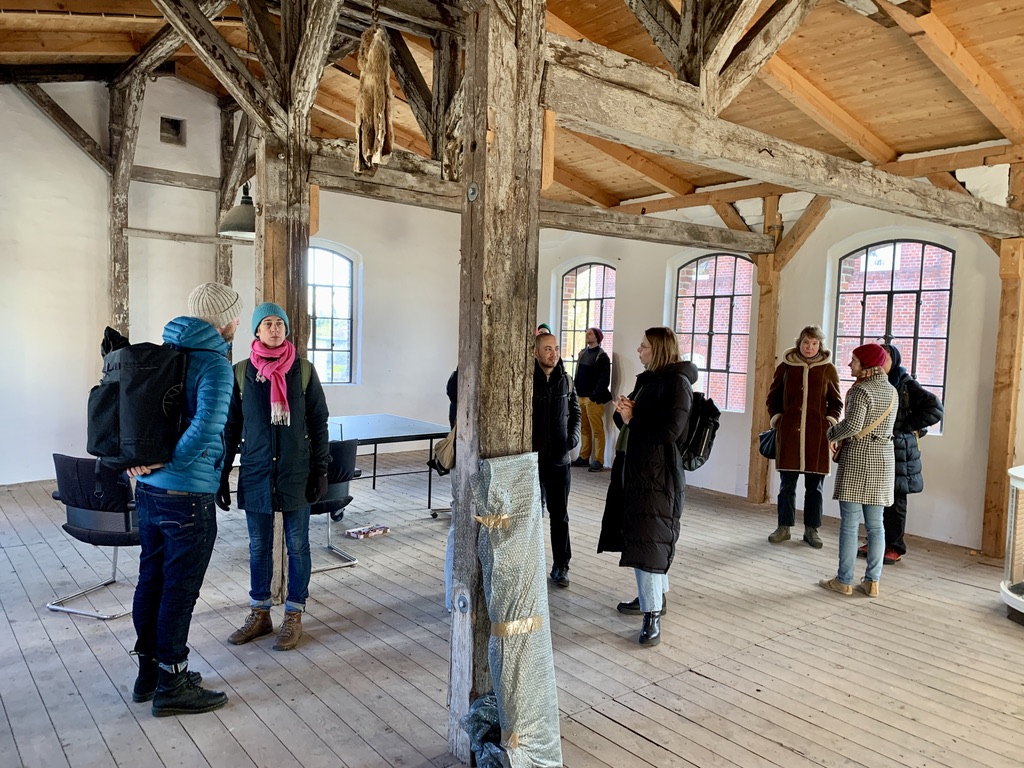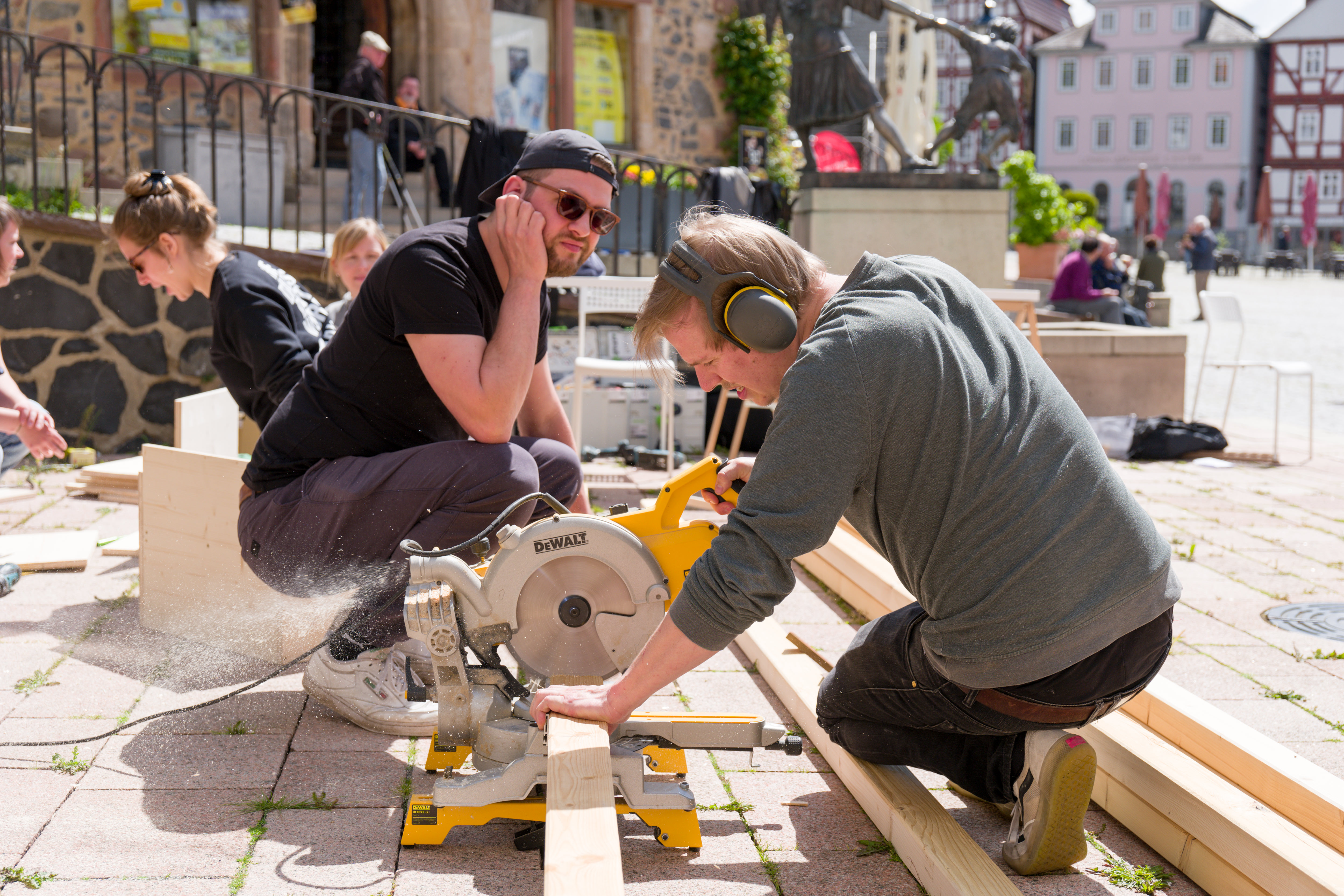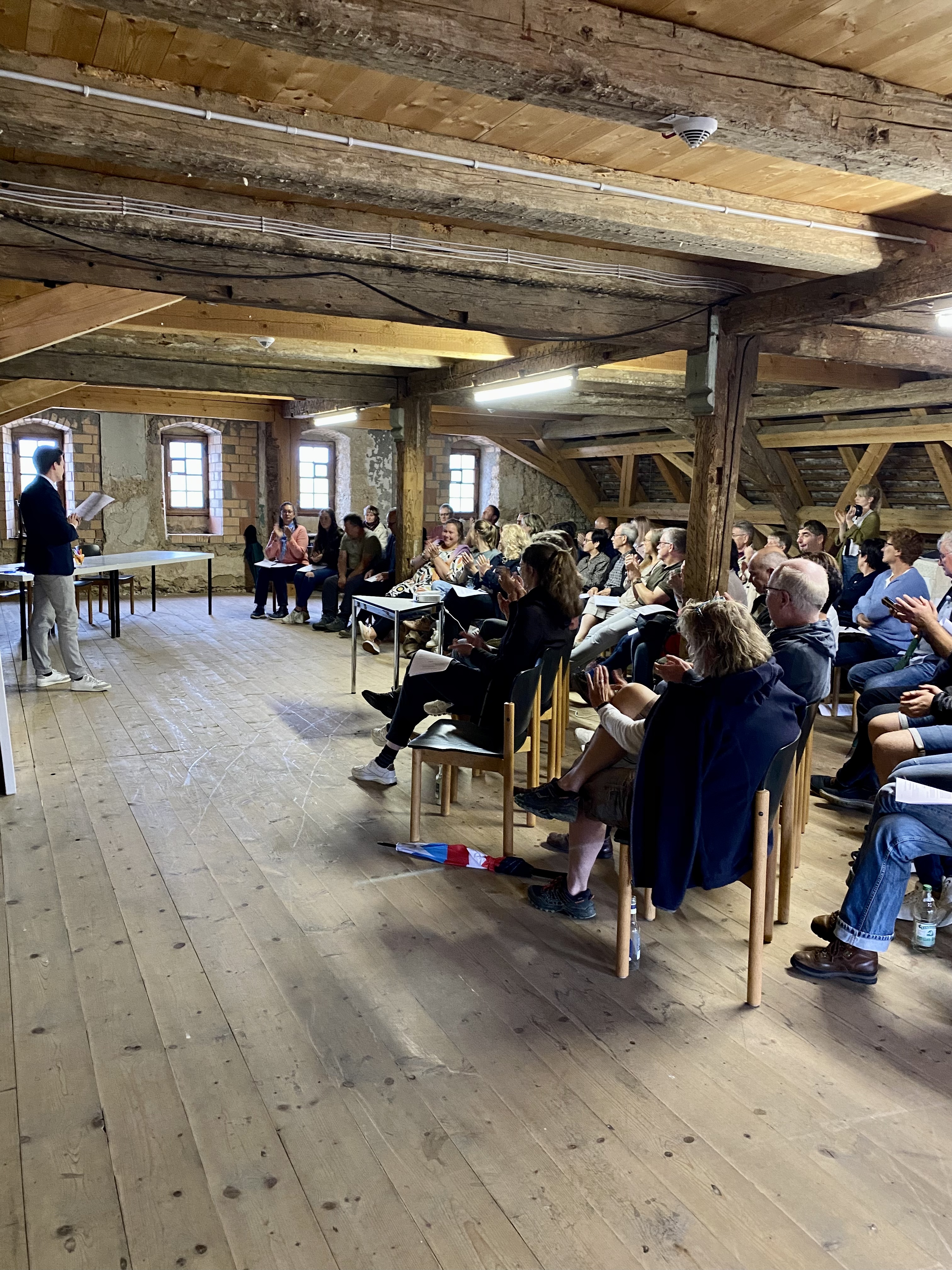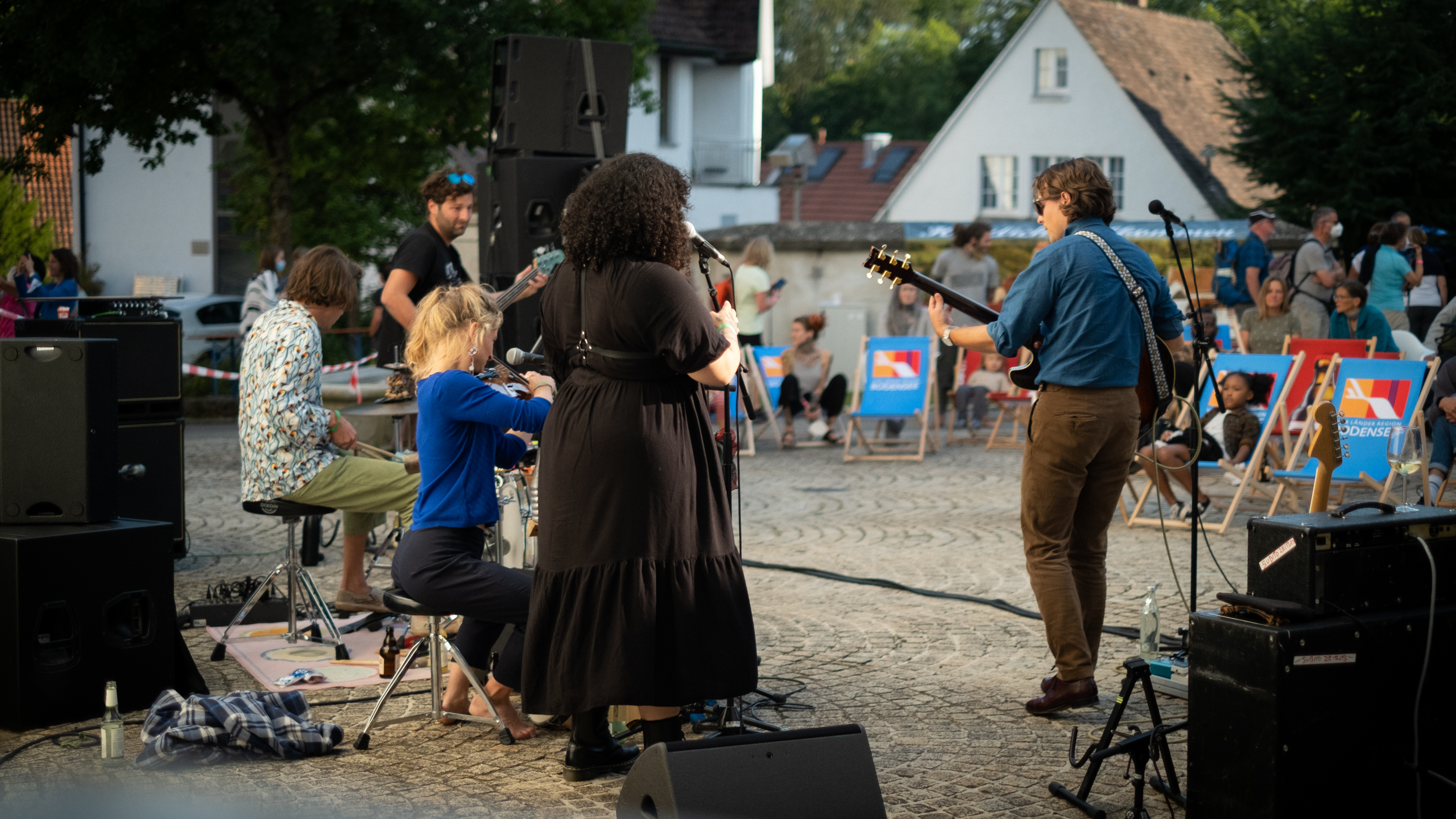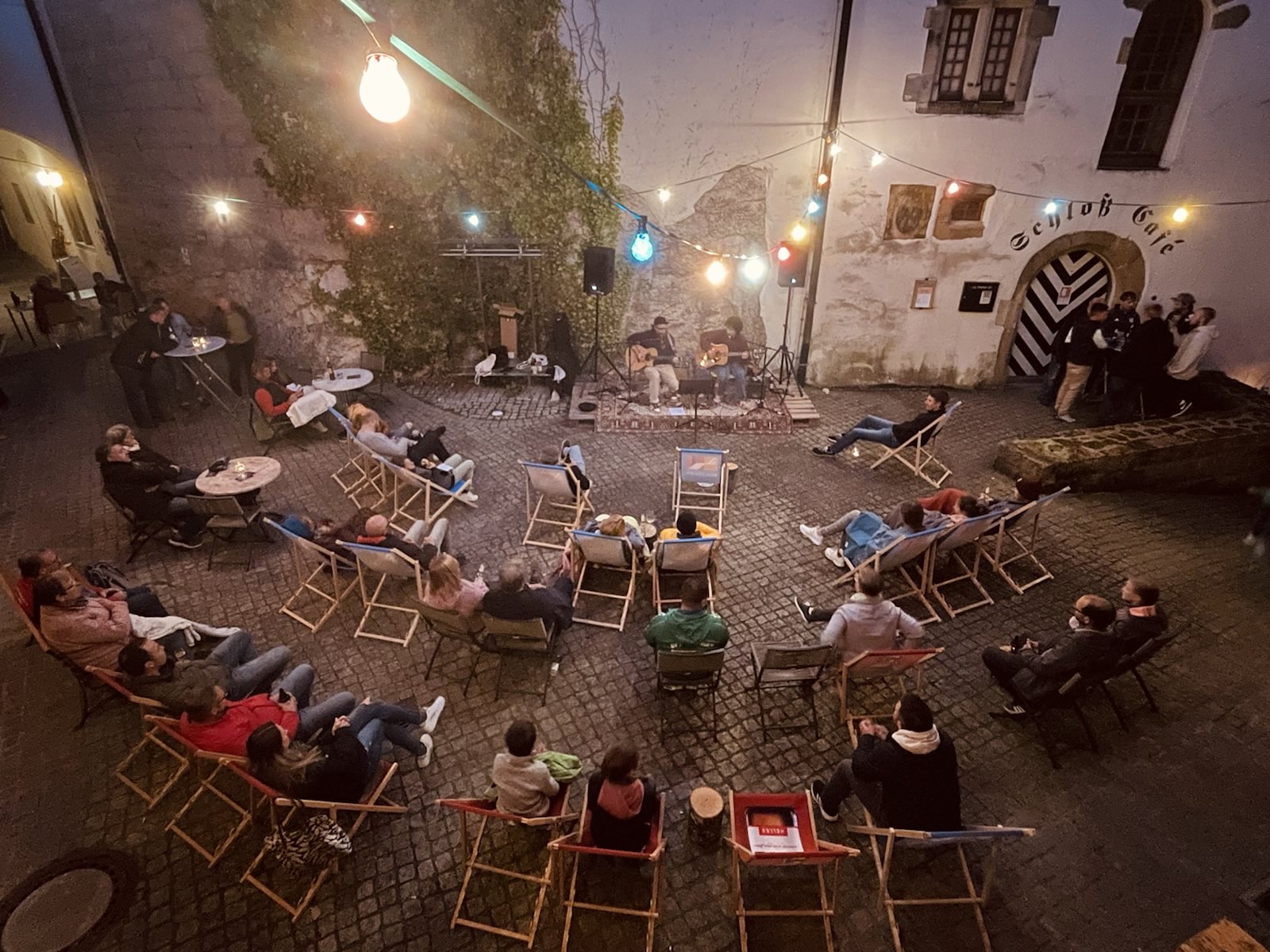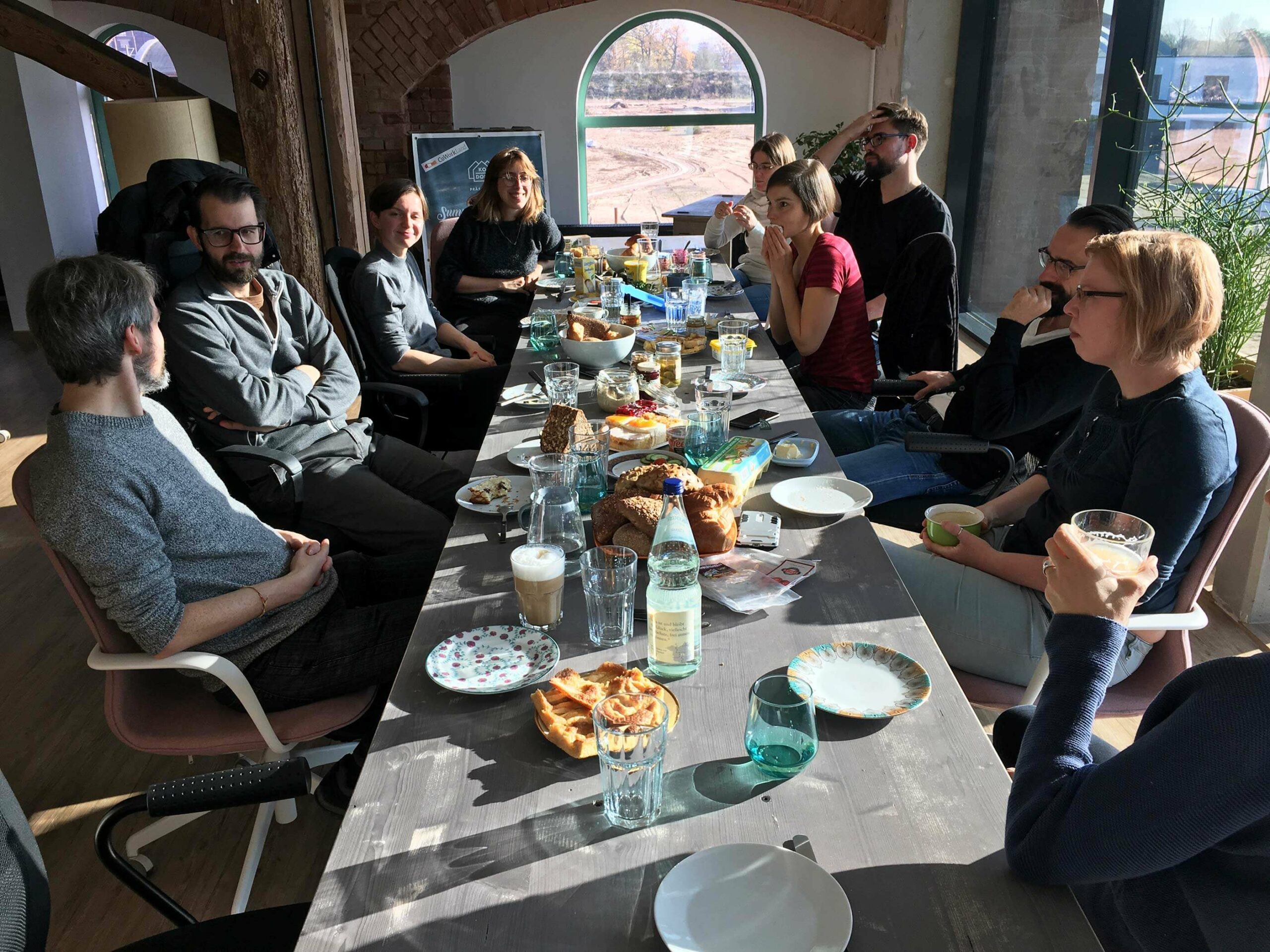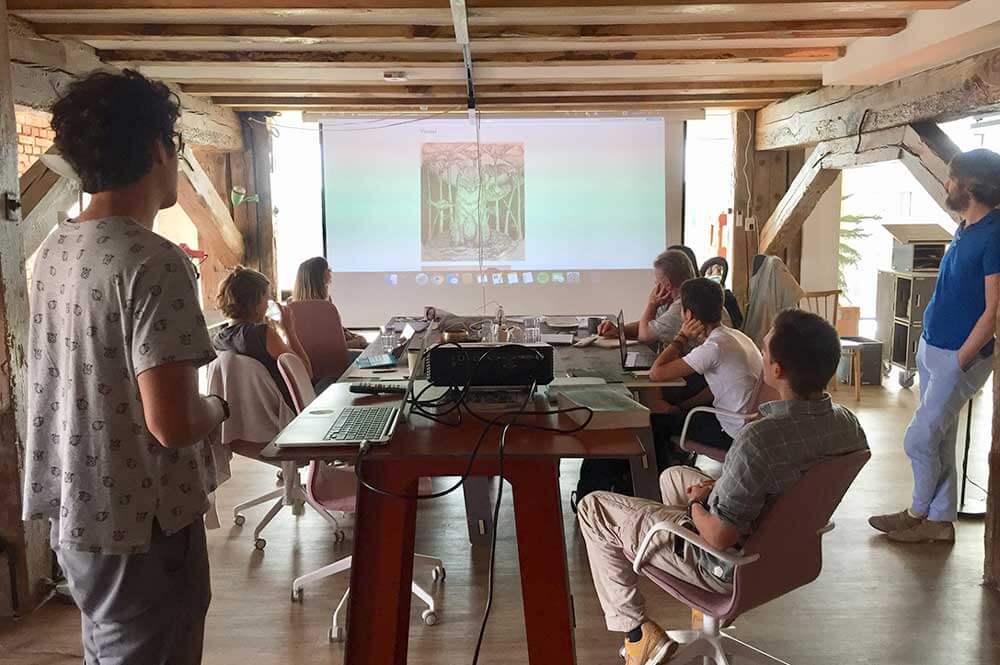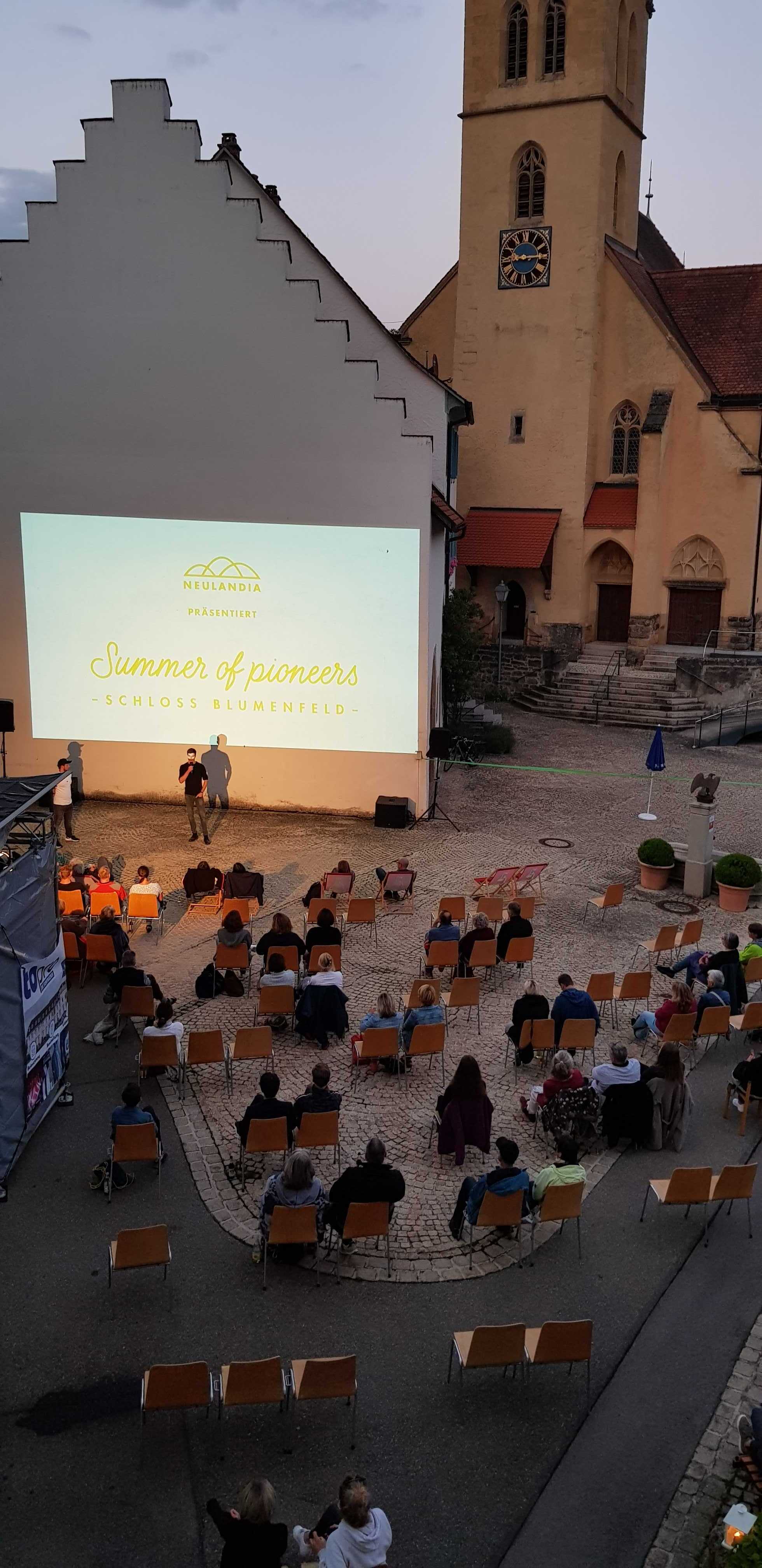Prioritising the places and people that need it the most
Summer of Pioneers
Summer of Pioneers -- A Taste of Rural Live
Since 2019, we’ve successfully launched transformative "Summer of Pionners" projects in multiple regions, connecting urban creatives with rural communities. By offering participants the chance to live, work, and collaborate in the countryside for (at least) half a year, we foster innovation, strengthen local networks, and revitalize rural areas. Together, we’re building future-oriented communities and showing that rural living is full of potential and opportunity.
Germany
Local
2019-20: Wittenberge (Brandenburg)
2021-22: Homberg Efze (Hessen)
2021-22: Schloss Blumenfeld (Baden-Württemberg)
2022: Herzberg Elster (Brandenburg)
2023: Mittweida (Sachsen)
2024: Grabow (Mecklenburg-Vorpommern)
2024: Dessau-Roßlau (Sachsen-Anhalt)
2021-22: Homberg Efze (Hessen)
2021-22: Schloss Blumenfeld (Baden-Württemberg)
2022: Herzberg Elster (Brandenburg)
2023: Mittweida (Sachsen)
2024: Grabow (Mecklenburg-Vorpommern)
2024: Dessau-Roßlau (Sachsen-Anhalt)
Mainly rural
It refers to other types of transformations (soft investment)
Yes
2024-12-31
No
No
No
As a representative of an organisation
The Summer of Pioneers is an initiative launched in 2019 to revitalize rural regions and communities facing economic, social, or demographic challenges. The project connects urban professionals, freelancers, and remote workers with rural towns in Germany, offering them the opportunity to live, work, and actively engage in these regions for several months. By bringing fresh ideas, diverse skill sets, and entrepreneurial spirit into these areas, the project addresses rural depopulation, strengthens local networks, and fosters long-term collaborations.
The initiative aims to promote sustainable rural development by creating vibrant communities and bridging the gap between urban innovation and rural potential. It seeks to reimagine rural living as attractive, modern, and full of opportunities.
Target groups are urban professionals, digital nomads, and remote workers seeking a change of scenery or a slower-paced lifestyle on the one hand, and rural communities and municipalities in need of economic, social, and cultural revitalization on the other hand.
Local businesses, neighbourhood communities and creative initiatives and communities are also involved in the projects as stakeholders.
The specific challanges of each location depend on the region, but the following general objectives apply to all projects:
- Attract new residents and potential long-term contributors to rural regions.
- Build and strengthen local networks through collaborations between participants and the local community.
- Revitalize underutilized spaces by transforming them into coworking hubs and centers of innovation.
- Enhance the visibility and attractiveness of rural areas as lively places to live and work.
Outcome:
- Increased visibility for participating regions as innovation hubs (very positive press coverage)
- Activation of underutilized buildings as coworking spaces
- Strengthened local economies through new businesses
- Improved social cohesion in the communities
The initiative aims to promote sustainable rural development by creating vibrant communities and bridging the gap between urban innovation and rural potential. It seeks to reimagine rural living as attractive, modern, and full of opportunities.
Target groups are urban professionals, digital nomads, and remote workers seeking a change of scenery or a slower-paced lifestyle on the one hand, and rural communities and municipalities in need of economic, social, and cultural revitalization on the other hand.
Local businesses, neighbourhood communities and creative initiatives and communities are also involved in the projects as stakeholders.
The specific challanges of each location depend on the region, but the following general objectives apply to all projects:
- Attract new residents and potential long-term contributors to rural regions.
- Build and strengthen local networks through collaborations between participants and the local community.
- Revitalize underutilized spaces by transforming them into coworking hubs and centers of innovation.
- Enhance the visibility and attractiveness of rural areas as lively places to live and work.
Outcome:
- Increased visibility for participating regions as innovation hubs (very positive press coverage)
- Activation of underutilized buildings as coworking spaces
- Strengthened local economies through new businesses
- Improved social cohesion in the communities
Revitalization
Community
Sustainable Housing
Social Inclusion
Creativity
The Summer of Pioneers project integrates sustainability at its core by addressing economic, social, and environmental challenges in rural areas. Its key objectives align with the principles of sustainable development, focusing on revitalizing communities, and promoting inclusive growth.
Economic Sustainability:
The project breathes new life into rural regions by attracting skilled professionals, entrepreneurs, and creatives who bring fresh perspectives and expertise. By establishing coworking spaces in underutilized buildings, the initiative revitalizes existing infrastructure, reducing the need for new construction and encouraging resource efficiency. Participants frequently collaborate with local businesses, introducing innovative ideas, strengthening economic networks, and generating new opportunities for long-term growth. Several regions have reported increased entrepreneurial activity and a surge in public and private interest in local development projects, creating a lasting economic impact.
Social Sustainability:
The project prioritizes building inclusive communities by fostering meaningful connections between participants and locals. Through workshops, a dedicated community management and cultural events, newcomers contribute to social cohesion while respecting local traditions and heritage. The initiative also provides rural regions with new narratives, shifting perceptions of these areas from “left behind” to places of opportunity, creativity, and collaboration. This inclusive approach ensures that communities are empowered to shape their own future.
Environmental Sustainability:
By promoting remote work and modern rural living, the project encourages lifestyles that reduce the environmental strain of urban density, such as overburdened infrastructure and housing markets. Participants’ (temporary) stays showcase how rural areas can offer modern living solutions without compromising nature.
Economic Sustainability:
The project breathes new life into rural regions by attracting skilled professionals, entrepreneurs, and creatives who bring fresh perspectives and expertise. By establishing coworking spaces in underutilized buildings, the initiative revitalizes existing infrastructure, reducing the need for new construction and encouraging resource efficiency. Participants frequently collaborate with local businesses, introducing innovative ideas, strengthening economic networks, and generating new opportunities for long-term growth. Several regions have reported increased entrepreneurial activity and a surge in public and private interest in local development projects, creating a lasting economic impact.
Social Sustainability:
The project prioritizes building inclusive communities by fostering meaningful connections between participants and locals. Through workshops, a dedicated community management and cultural events, newcomers contribute to social cohesion while respecting local traditions and heritage. The initiative also provides rural regions with new narratives, shifting perceptions of these areas from “left behind” to places of opportunity, creativity, and collaboration. This inclusive approach ensures that communities are empowered to shape their own future.
Environmental Sustainability:
By promoting remote work and modern rural living, the project encourages lifestyles that reduce the environmental strain of urban density, such as overburdened infrastructure and housing markets. Participants’ (temporary) stays showcase how rural areas can offer modern living solutions without compromising nature.
The Summer of Pioneers project excels in creating a high-quality experience for participants and local communities by blending aesthetics, design, and cultural enrichment. Its key objectives focus on reimagining rural living as an attractive, vibrant, and culturally rich alternative to urban life, emphasizing the beauty of both the natural and built environment.
Aesthetics and Design:
The project prioritizes the thoughtful transformation of underutilized spaces into inspiring coworking hubs and community meeting points. By repurposing historic buildings or abandoned infrastructure, the initiative breathes new life into these spaces while preserving their architectural heritage. Design choices reflect both modern functionality and a deep respect for the local environment, integrating sustainable materials and nature-inspired elements to create visually appealing and harmonious spaces. Participants are not only drawn to the picturesque rural landscapes but also to the creativity and care invested in the built environment, which fosters a sense of belonging and pride for both newcomers and locals.
Quality of Experience:
Through curated cultural programming, the Summer of Pioneers enriches the lives of participants and local residents alike. Events such as workshops, exhibitions, and collaborative projects provide platforms for creative exchange and learning. Participants bring fresh cultural perspectives and ideas, often organizing activities that highlight local traditions, crafts, and artistic practices. This interplay between innovation and heritage creates a dynamic cultural experience that connects people across generations and backgrounds.
Aesthetics and Design:
The project prioritizes the thoughtful transformation of underutilized spaces into inspiring coworking hubs and community meeting points. By repurposing historic buildings or abandoned infrastructure, the initiative breathes new life into these spaces while preserving their architectural heritage. Design choices reflect both modern functionality and a deep respect for the local environment, integrating sustainable materials and nature-inspired elements to create visually appealing and harmonious spaces. Participants are not only drawn to the picturesque rural landscapes but also to the creativity and care invested in the built environment, which fosters a sense of belonging and pride for both newcomers and locals.
Quality of Experience:
Through curated cultural programming, the Summer of Pioneers enriches the lives of participants and local residents alike. Events such as workshops, exhibitions, and collaborative projects provide platforms for creative exchange and learning. Participants bring fresh cultural perspectives and ideas, often organizing activities that highlight local traditions, crafts, and artistic practices. This interplay between innovation and heritage creates a dynamic cultural experience that connects people across generations and backgrounds.
The Summer of Pioneers places inclusion at the heart of its mission, striving to create equitable opportunities for individuals and communities while strengthening connections between diverse groups. The key objectives focus on ensuring accessibility, affordability, and participation for all, alongside promoting new societal models that embrace collaboration and shared responsibility.
A core objective of the Summer of Pioneers is to make rural living accessible to a wide range of people, regardless of their financial situation or background. By providing subsidized housing and coworking opportunities, the project lowers barriers for participants, enabling freelancers, creatives, and remote workers to experience rural life without significant financial risk. This affordability ensures that people from various socio-economic backgrounds can take part, fostering diversity within the program.
The project emphasizes collaboration and shared decision-making. Local stakeholders, including municipalities, residents, and businesses, are actively involved in designing and implementing the program. This inclusive governance model ensures that the needs and perspectives of the local community are respected and integrated. Participants, in turn, are encouraged to engage with locals through joint workshops, events, and initiatives, creating a two-way exchange of ideas and fostering mutual understanding.
Design for All Principles:
The project incorporates inclusive design by transforming public spaces and coworking hubs to be welcoming and accessible for all. Efforts are made to create environments that accommodate diverse needs, including spaces for community gatherings, flexible workstations, and areas for social interaction. These thoughtful designs prioritize functionality, comfort, and inclusivity, ensuring that everyone feels welcome and valued.
The Summer of Pioneers serves as a model for how inclusion can drive sustainable development and community cohesion.
A core objective of the Summer of Pioneers is to make rural living accessible to a wide range of people, regardless of their financial situation or background. By providing subsidized housing and coworking opportunities, the project lowers barriers for participants, enabling freelancers, creatives, and remote workers to experience rural life without significant financial risk. This affordability ensures that people from various socio-economic backgrounds can take part, fostering diversity within the program.
The project emphasizes collaboration and shared decision-making. Local stakeholders, including municipalities, residents, and businesses, are actively involved in designing and implementing the program. This inclusive governance model ensures that the needs and perspectives of the local community are respected and integrated. Participants, in turn, are encouraged to engage with locals through joint workshops, events, and initiatives, creating a two-way exchange of ideas and fostering mutual understanding.
Design for All Principles:
The project incorporates inclusive design by transforming public spaces and coworking hubs to be welcoming and accessible for all. Efforts are made to create environments that accommodate diverse needs, including spaces for community gatherings, flexible workstations, and areas for social interaction. These thoughtful designs prioritize functionality, comfort, and inclusivity, ensuring that everyone feels welcome and valued.
The Summer of Pioneers serves as a model for how inclusion can drive sustainable development and community cohesion.
The Summer of Pioneers thrives on the active involvement of citizens and civil society, recognizing their essential role in shaping the project’s success and impact. From its inception, the initiative has been designed as a collaborative effort, ensuring that both local residents and participants play meaningful roles in its development and execution.
Local citizens are key partners in the project, participating in the planning, execution, and day-to-day activities. Before a region is selected, municipalities engage with local communities to understand their needs, challenges, and aspirations. This input helps tailor the project to address specific local issues, whether it’s activating vacant spaces, boosting local businesses, or enhancing cultural vibrancy. During the program, residents collaborate with participants through workshops, cultural events, and community projects, fostering a two-way exchange of ideas and knowledge.
Local civil society organizations, including cultural associations, business networks, and non-profits, actively contribute to the project by providing resources, co-hosting events, and facilitating connections between participants and the broader community. Their involvement ensures that the initiative is deeply rooted in local contexts and addresses pressing social, economic, and cultural issues.
This deep level of engagement has had a transformative impact on the project. The collaboration between participants and locals has led to the successful revitalization of spaces, the launch of new local initiatives, and stronger social cohesion. Participants bring fresh perspectives and ideas, while locals contribute their knowledge, networks, and traditions, creating a mutually beneficial dynamic.
The project builds an inclusive environment where citizens are not merely passive beneficiaries but active co-creators. This approach strengthens trust, ensures long-term sustainability, and empowers communities to continue driving change.
Local citizens are key partners in the project, participating in the planning, execution, and day-to-day activities. Before a region is selected, municipalities engage with local communities to understand their needs, challenges, and aspirations. This input helps tailor the project to address specific local issues, whether it’s activating vacant spaces, boosting local businesses, or enhancing cultural vibrancy. During the program, residents collaborate with participants through workshops, cultural events, and community projects, fostering a two-way exchange of ideas and knowledge.
Local civil society organizations, including cultural associations, business networks, and non-profits, actively contribute to the project by providing resources, co-hosting events, and facilitating connections between participants and the broader community. Their involvement ensures that the initiative is deeply rooted in local contexts and addresses pressing social, economic, and cultural issues.
This deep level of engagement has had a transformative impact on the project. The collaboration between participants and locals has led to the successful revitalization of spaces, the launch of new local initiatives, and stronger social cohesion. Participants bring fresh perspectives and ideas, while locals contribute their knowledge, networks, and traditions, creating a mutually beneficial dynamic.
The project builds an inclusive environment where citizens are not merely passive beneficiaries but active co-creators. This approach strengthens trust, ensures long-term sustainability, and empowers communities to continue driving change.
The Summer of Pioneers engages a diverse range of stakeholders at local, regional, national, and European levels, ensuring the project is well-rounded, impactful, and sustainable. These collaborations enhance the project’s implementation by aligning resources, expertise, and networks.
At the core of the project are local municipalities, businesses, and residents. Municipalities provide logistical support, such as identifying and activating underutilized spaces for housing and coworking hubs. Local businesses and cultural organizations collaborate to host events, workshops, and networking opportunities, integrating participants into the community. Residents are active co-creators, welcoming newcomers and collaborating on projects that address local needs. This grassroots involvement ensures the project aligns with the community’s unique identity and priorities.
Regional development agencies and economic councils play a critical role in scaling the project’s impact. They provide funding, strategic guidance, and connections to regional networks, helping to amplify the project’s visibility. By promoting the initiative as a model for rural development, regional stakeholders facilitate knowledge-sharing and encourage other municipalities to adopt similar approaches.
At the national level, governmental organizations and non-profits support the project through funding and policy alignment. National-level advocacy has helped position the Summer of Pioneers as a flagship initiative for rural revitalization, demonstrating its potential to address nationwide challenges such as urban-rural inequality and demographic shifts.
The project aligns with the values of the New European Bauhaus and the EU’s sustainability goals. European networks and organizations provide platforms for sharing best practices, increasing visibility, and fostering cross-border collaboration.Their involvement elevates the project as an example of how European values can be realized locally.
At the core of the project are local municipalities, businesses, and residents. Municipalities provide logistical support, such as identifying and activating underutilized spaces for housing and coworking hubs. Local businesses and cultural organizations collaborate to host events, workshops, and networking opportunities, integrating participants into the community. Residents are active co-creators, welcoming newcomers and collaborating on projects that address local needs. This grassroots involvement ensures the project aligns with the community’s unique identity and priorities.
Regional development agencies and economic councils play a critical role in scaling the project’s impact. They provide funding, strategic guidance, and connections to regional networks, helping to amplify the project’s visibility. By promoting the initiative as a model for rural development, regional stakeholders facilitate knowledge-sharing and encourage other municipalities to adopt similar approaches.
At the national level, governmental organizations and non-profits support the project through funding and policy alignment. National-level advocacy has helped position the Summer of Pioneers as a flagship initiative for rural revitalization, demonstrating its potential to address nationwide challenges such as urban-rural inequality and demographic shifts.
The project aligns with the values of the New European Bauhaus and the EU’s sustainability goals. European networks and organizations provide platforms for sharing best practices, increasing visibility, and fostering cross-border collaboration.Their involvement elevates the project as an example of how European values can be realized locally.
The Summer of Pioneers integrates a wide array of disciplines and knowledge fields, ensuring a holistic approach to rural revitalization. The project combines expertise from areas such as urban planning, design, sustainable development, economics, social sciences, and cultural studies, creating a rich, interdisciplinary foundation that drives its success.
Urban planners and architects were crucial in transforming underutilized rural spaces into functional, innovative coworking hubs and community spaces. They applied sustainable design principles to ensure spaces were not only aesthetically pleasing but also functional and adaptable for various needs. Their work emphasized the importance of blending modern design with local heritage, creating environments that respect tradition while encouraging innovation.
Economists and business development experts helped assess the economic viability of the project, identifying local business opportunities, fostering entrepreneurship, and creating models for sustainable rural economies. They facilitated the integration of participants into the local economy, helping them collaborate with regional businesses and providing guidance on business incubation.
Social scientists and community engagement specialists ensured that the project was inclusive and centered around the needs of local populations. They conducted surveys, held discussions, and worked directly with residents to better understand their neeeds.
The collaboration across these diverse fields created a dynamic and integrated approach to rural revitalization. The interaction between design, sustainability, economics, and social sciences enriched the project, ensuring that solutions were multifaceted and well-rounded. This interdisciplinary process added significant value, resulting in a project that not only revitalizes physical spaces but also strengthens local economies, communities, and cultures, creating a truly sustainable impact.
Urban planners and architects were crucial in transforming underutilized rural spaces into functional, innovative coworking hubs and community spaces. They applied sustainable design principles to ensure spaces were not only aesthetically pleasing but also functional and adaptable for various needs. Their work emphasized the importance of blending modern design with local heritage, creating environments that respect tradition while encouraging innovation.
Economists and business development experts helped assess the economic viability of the project, identifying local business opportunities, fostering entrepreneurship, and creating models for sustainable rural economies. They facilitated the integration of participants into the local economy, helping them collaborate with regional businesses and providing guidance on business incubation.
Social scientists and community engagement specialists ensured that the project was inclusive and centered around the needs of local populations. They conducted surveys, held discussions, and worked directly with residents to better understand their neeeds.
The collaboration across these diverse fields created a dynamic and integrated approach to rural revitalization. The interaction between design, sustainability, economics, and social sciences enriched the project, ensuring that solutions were multifaceted and well-rounded. This interdisciplinary process added significant value, resulting in a project that not only revitalizes physical spaces but also strengthens local economies, communities, and cultures, creating a truly sustainable impact.
The Summer of Pioneers stands out for its innovative approach to rural revitalization, offering a stark contrast to mainstream development initiatives that often focus on urban-centered solutions or top-down interventions. Its innovation lies in its holistic, community-driven model that merges sustainability, creativity, and inclusivity, while fostering tangible impact in rural regions.
Unlike traditional rural development projects, which may focus on infrastructure or basic services alone, the Summer of Pioneers combines physical revitalization with the activation of human capital. By creating coworking hubs, temporary housing, and community spaces within underutilized or abandoned buildings, it demonstrates how rural areas can be transformed into dynamic places for work, creativity, and collaboration, reversing the trend of urban migration. This approach not only tackles housing and economic challenges but also combats rural depopulation by offering a viable, attractive alternative to city living.
This collaborative framework empowers both participants and local communities to co-create, ensuring that the interventions are not only innovative but also contextually appropriate. It goes beyond the typical model of temporary engagement and offers lasting change by involving local stakeholders in decision-making, fostering a sense of ownership and responsibility.
Furthermore, the project incorporates principles of inclusive governance and design for all, prioritizing accessibility, affordability, and social equity. It actively engages citizens and civil society, from rural residents to local businesses, in a shared vision of community development. This participatory process contrasts sharply with more conventional models and programs.
In essence, the Summer of Pioneers is an innovative model for rural revitalization that not only addresses physical, economic, and social challenges but does so through creative, sustainable, and inclusive practices.
Unlike traditional rural development projects, which may focus on infrastructure or basic services alone, the Summer of Pioneers combines physical revitalization with the activation of human capital. By creating coworking hubs, temporary housing, and community spaces within underutilized or abandoned buildings, it demonstrates how rural areas can be transformed into dynamic places for work, creativity, and collaboration, reversing the trend of urban migration. This approach not only tackles housing and economic challenges but also combats rural depopulation by offering a viable, attractive alternative to city living.
This collaborative framework empowers both participants and local communities to co-create, ensuring that the interventions are not only innovative but also contextually appropriate. It goes beyond the typical model of temporary engagement and offers lasting change by involving local stakeholders in decision-making, fostering a sense of ownership and responsibility.
Furthermore, the project incorporates principles of inclusive governance and design for all, prioritizing accessibility, affordability, and social equity. It actively engages citizens and civil society, from rural residents to local businesses, in a shared vision of community development. This participatory process contrasts sharply with more conventional models and programs.
In essence, the Summer of Pioneers is an innovative model for rural revitalization that not only addresses physical, economic, and social challenges but does so through creative, sustainable, and inclusive practices.
The Summer of Pioneers follows a participatory, loacation-based approach that fosters sustainable rural revitalization through collaboration, experimentation, and community-driven development. The methodology is designed to integrate external expertise with local knowledge, ensuring that both participants and residents actively shape the transformation of rural spaces.
At its core, the project uses a temporary residency model, inviting remote workers, entrepreneurs, and creatives to relocate to selected rural areas for several months. This controlled time frame allows for structured interventions, knowledge exchange, and the rapid testing of new ideas. Unlike conventional rural development programs that often rely on large-scale infrastructure investments, this initiative focuses on people as catalysts for change, activating existing spaces and social structures rather than creating new ones from scratch.
The approach is highly interdisciplinary, incorporating elements of urban planning, sustainable design, economic development, and social innovation. Key steps include identifying suitable locations with strong local engagement, setting up affordable housing and coworking spaces, and fostering collaboration between newcomers and local stakeholders. Workshops, public events, and cultural activities are central components, ensuring that interactions go beyond professional work and lead to meaningful connections.
A bottom-up governance model is fundamental to the project’s success. From the outset, local governments, businesses, and civil society organizations are actively involved, ensuring that initiatives align with regional needs and long-term development goals. The flexibility of this model allows for tailored solutions in different locations, adapting to local strengths and challenges.
At its core, the project uses a temporary residency model, inviting remote workers, entrepreneurs, and creatives to relocate to selected rural areas for several months. This controlled time frame allows for structured interventions, knowledge exchange, and the rapid testing of new ideas. Unlike conventional rural development programs that often rely on large-scale infrastructure investments, this initiative focuses on people as catalysts for change, activating existing spaces and social structures rather than creating new ones from scratch.
The approach is highly interdisciplinary, incorporating elements of urban planning, sustainable design, economic development, and social innovation. Key steps include identifying suitable locations with strong local engagement, setting up affordable housing and coworking spaces, and fostering collaboration between newcomers and local stakeholders. Workshops, public events, and cultural activities are central components, ensuring that interactions go beyond professional work and lead to meaningful connections.
A bottom-up governance model is fundamental to the project’s success. From the outset, local governments, businesses, and civil society organizations are actively involved, ensuring that initiatives align with regional needs and long-term development goals. The flexibility of this model allows for tailored solutions in different locations, adapting to local strengths and challenges.
The Summer of Pioneers is designed as a scalable and transferable model for rural revitalization, and its success across multiple regions and municipalities since 2019 proves its adaptability. Key elements of the project — its methodology, governance structure, and community-driven approach — can be replicated in other rural areas facing similar challenges, such as depopulation, economic stagnation, or underutilized spaces.
One of the most transferable aspects is the temporary residency model, which brings remote workers, creatives, and entrepreneurs to rural communities for a set period. This approach not only introduces fresh perspectives and skills but also creates immediate social and economic benefits for local communities. It has been successfully implemented in diverse municipalities, each time tailored to the specific needs and characteristics of the location.
Additionally, the project’s emphasis on adaptive reuse of existing spaces—turning vacant buildings into vibrant coworking and living spaces—can be easily transferred to other rural or small-town settings. By leveraging existing infrastructure rather than investing in costly new developments, communities can create dynamic, multifunctional spaces with lower financial risk.
Beyond physical transformation, the social innovation and knowledge exchange processes embedded in the project are highly transferable. The methods used to integrate newcomers, encourage skill-sharing, and foster local entrepreneurship can be applied in different demographic, geographic, and economic contexts.
With its proven track record across multiple regions in Germany, the Summer of Pioneers offers a flexible, impactful blueprint for communities across Europe seeking to attract new residents, stimulate local economies, and build resilient, future-ready rural ecosystems.
One of the most transferable aspects is the temporary residency model, which brings remote workers, creatives, and entrepreneurs to rural communities for a set period. This approach not only introduces fresh perspectives and skills but also creates immediate social and economic benefits for local communities. It has been successfully implemented in diverse municipalities, each time tailored to the specific needs and characteristics of the location.
Additionally, the project’s emphasis on adaptive reuse of existing spaces—turning vacant buildings into vibrant coworking and living spaces—can be easily transferred to other rural or small-town settings. By leveraging existing infrastructure rather than investing in costly new developments, communities can create dynamic, multifunctional spaces with lower financial risk.
Beyond physical transformation, the social innovation and knowledge exchange processes embedded in the project are highly transferable. The methods used to integrate newcomers, encourage skill-sharing, and foster local entrepreneurship can be applied in different demographic, geographic, and economic contexts.
With its proven track record across multiple regions in Germany, the Summer of Pioneers offers a flexible, impactful blueprint for communities across Europe seeking to attract new residents, stimulate local economies, and build resilient, future-ready rural ecosystems.
The Summer of Pioneers tackles some of the most pressing global challenges—rural depopulation, economic inequality, social fragmentation, and environmental sustainability—by offering localized, community-driven solutions that empower rural areas to thrive in a rapidly changing world.
One of the key issues the project addresses is rural exodus and demographic imbalance. Across Europe and beyond, small towns and rural areas are losing population as young people migrate to cities in search of jobs and opportunities. This trend leads to economic stagnation, vacant buildings, and weakened social structures. The Summer of Pioneers provides a practical alternative by proving that rural areas can be attractive, livable, and economically viable—especially for remote workers, digital entrepreneurs, and creatives who are no longer bound to urban centers. By activating existing spaces and fostering a sense of community, the project revitalizes local economies while maintaining the cultural and social identity of each region.
The initiative also offers solutions to the economic divide between urban and rural areas. Many mainstream development programs focus on cities, leaving rural areas with fewer investments and opportunities. Instead of relying on top-down interventions, the Summer of Pioneers takes a bottom-up approach, encouraging local entrepreneurship, skill-sharing, and new business models tailored to rural realities. This contributes to economic resilience by diversifying local economies and reducing dependence on a single industry.
Finally, the project tackles social fragmentation and isolation by fostering inclusive, participatory development. In an era where communities are becoming increasingly disconnected, the Summer of Pioneers builds bridges between newcomers and local residents, strengthening social cohesion and demonstrating how rural areas can be hubs of innovation, creativity, and collaboration.
One of the key issues the project addresses is rural exodus and demographic imbalance. Across Europe and beyond, small towns and rural areas are losing population as young people migrate to cities in search of jobs and opportunities. This trend leads to economic stagnation, vacant buildings, and weakened social structures. The Summer of Pioneers provides a practical alternative by proving that rural areas can be attractive, livable, and economically viable—especially for remote workers, digital entrepreneurs, and creatives who are no longer bound to urban centers. By activating existing spaces and fostering a sense of community, the project revitalizes local economies while maintaining the cultural and social identity of each region.
The initiative also offers solutions to the economic divide between urban and rural areas. Many mainstream development programs focus on cities, leaving rural areas with fewer investments and opportunities. Instead of relying on top-down interventions, the Summer of Pioneers takes a bottom-up approach, encouraging local entrepreneurship, skill-sharing, and new business models tailored to rural realities. This contributes to economic resilience by diversifying local economies and reducing dependence on a single industry.
Finally, the project tackles social fragmentation and isolation by fostering inclusive, participatory development. In an era where communities are becoming increasingly disconnected, the Summer of Pioneers builds bridges between newcomers and local residents, strengthening social cohesion and demonstrating how rural areas can be hubs of innovation, creativity, and collaboration.
The Summer of Pioneers has had a profound impact across various German regions, benefiting both direct and indirect beneficiaries by revitalizing rural and shrinking areas and fostering economic, social, and cultural resilience. Some examples include:
In Wittenberge, initiatives like Stadtsalon Safari, elblandwerker, and Pop-Up Prignitz revitalized local culture, boosted tourism, and strengthened community ties. These efforts led to population growth, the creation of over 400 cooperative members, and the successful renovation of historical buildings. Local businesses thrived, supported by over 3 million euros in funding, earning the town recognition through various awards.
In Homberg (Efze), the Homberger Marktcampus transformed the cityscape into sustainable coworking spaces and community hubs. It also sparked the creation of a sustainable urban development company by former pioneers, proving the long-term potential of temporary interventions.
In Herzberg (Elster), the Summer of Pioneers inspired innovative housing solutions like KoCampus, repurposing a building for students and apprentices. The initiative promoted community-driven events, job creation, and inclusion of vulnerable groups.
Schloss Blumenfeld in Tengen stands out for its transformation from a neglected building into a vibrant public space. The Schlosscafé, with over 2,000 visitors, and other cultural activities have become central to the local community. The Bürgerverein Schloss Blumenfeld was established, ensuring long-term preservation and engagement.
Across all regions, local residents played a vital role in shaping these outcomes. From small-town revitalization to intergenerational exchanges, the project has demonstrated that rural areas can thrive through a combination of creative and practical solutions, promoting social innovation, cultural pride, and economic sustainability. The Summer of Pioneers serves as a model for communities across Europe facing similar challenges.
In Wittenberge, initiatives like Stadtsalon Safari, elblandwerker, and Pop-Up Prignitz revitalized local culture, boosted tourism, and strengthened community ties. These efforts led to population growth, the creation of over 400 cooperative members, and the successful renovation of historical buildings. Local businesses thrived, supported by over 3 million euros in funding, earning the town recognition through various awards.
In Homberg (Efze), the Homberger Marktcampus transformed the cityscape into sustainable coworking spaces and community hubs. It also sparked the creation of a sustainable urban development company by former pioneers, proving the long-term potential of temporary interventions.
In Herzberg (Elster), the Summer of Pioneers inspired innovative housing solutions like KoCampus, repurposing a building for students and apprentices. The initiative promoted community-driven events, job creation, and inclusion of vulnerable groups.
Schloss Blumenfeld in Tengen stands out for its transformation from a neglected building into a vibrant public space. The Schlosscafé, with over 2,000 visitors, and other cultural activities have become central to the local community. The Bürgerverein Schloss Blumenfeld was established, ensuring long-term preservation and engagement.
Across all regions, local residents played a vital role in shaping these outcomes. From small-town revitalization to intergenerational exchanges, the project has demonstrated that rural areas can thrive through a combination of creative and practical solutions, promoting social innovation, cultural pride, and economic sustainability. The Summer of Pioneers serves as a model for communities across Europe facing similar challenges.

